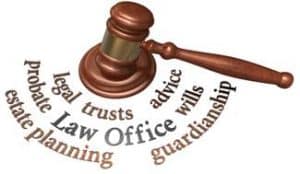Disclaimer: The following primer on probate law contains only basic information that you’ll need when dealing with a deceased person’s will and should never be interpreted as legal advice. Contacting a probate lawyer as soon as possible would help you further understand your state’s probate law and any legal technicalities you might encounter whether you’re a beneficiary, executor or administrator.
Regardless of a person’s cause of death, they might have left a will behind before their passing. A deceased person’s will includes instructions as to how each of their assets should be handed out to specific beneficiaries. Some may get personal items, or small gifts of sentimental value, whereas others may find themselves inheriting a house that is paid off. Irrespective of what the assets are, distributing all assets of a deceased person should be easy enough as one only needs to follow the instructions stated in the will itself. But in case any problems might arise in a deceased person’s will, probate law can deal with it legally.
What Is Probate and Who Can Distribute a Deceased Person’s Assets?
If a deceased person drafted a will when they were still alive, the document itself has to undergo probate. A probate court would then decide if the will itself is legally valid or not before any of their assets can be distributed to all the beneficiaries included in it.
- A deceased person who had written a will should include someone as an executor who would represent them after their death and present the said document to a probate court.
- But if a deceased person’s will has been proven invalid or no will was written at all, a first-degree relative should ask the probate court to appoint them as administrator.
- An executor or administrator is legally allowed to distribute the deceased person’s assets according to either the instructions stated in the will for the former or a state-drafted will for the latter.
How Does the Probate Process Work?
Once either an executor or administrator has been appointed to execute the deceased person’s will, the probate process officially starts rolling. While specifics may vary according to your state’s probate laws, the probate process generally follows these steps:
- All beneficiaries as stated in the deceased person’s will should be notified once a petition has been filed to probate the said document.
Before any of the deceased’s assets can be legally distributed, all beneficiaries mentioned in the will should be informed ahead of time that a petition to probate the said document has been filed in court.
- In case anyone among the beneficiaries included in the will has any objections and concerns, the probate court would hear them all out and decide on what to do about them. An experienced probate litigation attorney in Denver or similar in the local area can provide assistance in dealing with such issues, ensuring that their client’s probate proceedings are handled as efficiently as possible.
- Notice of the court hearing regarding probate of the deceased’s will also has to be published in a newspaper so that any other interested persons can come forward before the start of the proceedings.
- The executor or administrator appointed by the probate court should then send a notice to the deceased person’s creditors.
As the deceased may have left some unsettled debts behind after their death, the appointed executor or administrator should inform creditors via a written notice that they’re allowed to claim assets not passed on to anyone in particular.
- However, creditors are only allowed a certain period of time to make claims on the deceased’s assets. It would thus be helpful for them to check their state’s probate laws first so that they could find out how much time they’ve got left to make their claims.
- All of the deceased’s assets are then inventoried and appraised to determine their respective values in the current market.
- Some of the deceased’s assets can be sold by the executor or administrator. The money made from the sale would then be given to creditors as payment for the deceased’s unsettled debts.
- Another petition has to be filed by the executor or administrator to the probate court asking if they can already perform final distribution of assets to beneficiaries.

- If the will calls for a trust fund to be created under a certain beneficiary, the stated amount of cash has to be deposited there as soon as possible.
- All other assets of the deceased that have beneficiaries attached to them can then be simply handed out as long as the instructions stated in the will have been diligently followed by the executor or administrator.
While not legally required, some people write a will before their death so they can pass on their assets to anyone they know who’s still alive. However, certain beneficiaries included in a deceased person’s will might raise some concerns and even objections to it. The above information on probate law should help ease any worries that beneficiaries may have over a deceased person’s will. But as every state has its own laws surrounding probate, it would be wise to consult an attorney who can further clear things up as well.
Cecille Cunningham
Cecille Cunningham loves writing for the common reader, especially on helping them make sense of various topics on the law. She currently writes for multiple law firms. In her spare time she cooks for his family and friends.


